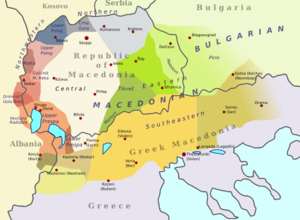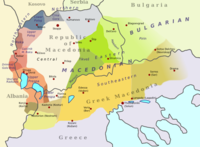| Revision as of 14:26, 17 November 2010 edit203.59.92.76 (talk) →Phonological characteristics← Previous edit |
Latest revision as of 20:39, 8 November 2024 edit undoMonkbot (talk | contribs)Bots3,695,952 editsm Task 20: replace {lang-??} templates with {langx|??} ‹See Tfd› (Replaced 1);Tag: AWB |
| (70 intermediate revisions by 38 users not shown) |
| Line 1: |
Line 1: |
|
|
{{Short description|Dialect of Macedonian}} |
|
] |
|
] |
|
|
{{Listen |
|
|
|
|
|
| header = Дијалектни примери |
| ⚫ |
The '''Prilep-Bitola dialect''' ({{lang-mk|Прилепско-битолски дијалект}}, ''Prilepsko-bitolski dijalekt'') is a member of the central subgroup of the western group of ] of the ]. This dialect is mainly spoken in the towns of ] and ] and in surrounding areas in the ], as well as by the ] population in and around ] (Lerin)<ref>'''author missing'''. Леринскиот говор. Македонски jазик, 1983, ХХХIV, стр. 23-49.</ref><ref>Hill, Peter. The Dialect of Gorno Kalenik 1991, Columbus, OH</ref> in neighbouring ]. The Prilep-Bitola dialect, along with other peripheral west-central dialects, provides much of the basis for modern ].<ref>Makedonska gramatika by Krume Kepeski |
|
|
|
| filename = Prilep-Bitola dialect speech - Topolčani.ogg |
|
Language, Vol. 27, No. 2 (Apr. - Jun., 1951), pp. 180-187</ref> |
|
|
|
| title = Peter's Mourning |
|
|
| description = Folk epic told by a resident of ], ] region |
|
|
| filename2 = Prilep-Bitola dialect speech - Bitola.ogg |
|
|
| title2 = The Pebble Stew |
|
|
| description2 = Tale told by a woman from the city of ] |
|
|
}} |
|
⚫ |
The '''Prilep-Bitola dialect''' ({{langx|mk|Прилепско-битолски дијалект}}, ''Prilepsko-bitolski dijalekt'') is a member of the central subgroup of the western group of ]. This dialect is spoken in much of the ] (more specifically, the ], ], ] and ] municipalities), as well as by the ] population in and around ] (Lerin)<ref>{{Cite book |last=Vidoeski|first=Božidar (Божидар Видоески) |title=Lerinskiot govor. |date=1983|pages=23–49 |language=mk |script-title=mk:Леринскиот говор}}</ref><ref>{{Cite book |last=Hill |first=Peter |url=https://books.google.com/books?id=ibxiAAAAMAAJ |title=The Dialect of Gorno Kalenik |date=1991 |publisher=Slavica Publishers |location=Columbus, OH |isbn=9780893572174 |language=en |via=Google Books}}</ref> in neighbouring ]. The Prilep-Bitola dialect, along with other peripheral west-central dialects, provides much of the basis for modern ].<ref>{{Cite journal |last=Lunt |first=Horace G. |date=1951 |title=Makedonska gramatika by Krume Kepeski |journal=Language |language=en |volume=27 |issue=2 |pages=180–187 |doi=10.2307/410435 |jstor=410435}}</ref> ] dialects have developed in the cities of ] and ]. |
|
|
|
|
|
==Phonological characteristics== |
|
==Phonological characteristics== |
|
|
|
|
|
The phonological characteristics of the Prilep-Bitola dialect which also can also be found in the other peripheral dialects are: |
|
The phonological characteristics of the Bitola-Prilep dialect which can also be found in the other peripheral dialects are: |
|
*] word stress (see ]) |
|
*mostly ] word stress (see ]); |
|
*the ] has reflexed into {{IPA| |
|
*] *ǫ has reflexed into {{IPA|/a/}}: |
|
|
::rǫka > ''рака'' {{IPA|/ˈraka/}} ('hand') |
|
*the use of the inflectional suffixe {{IPA|-}} in third-person singular verbs (e.g. ''можи'' and ''биди'' versus the standard ''може'' and ''биде'') |
|
|
|
*except for the Prilep sub-dialects, Bitola sub-dialects have two phonemic ]s ({{IPA|/ɫ/}} and {{IPA|/l/}}, continuants of Proto-Slavic *l and *ĺ): |
|
*absence of the intervocalic {{IPA|}} in the plural forms of monosyllabic nouns (e.g. лебо(в)и):<ref> Граматика на македонскиот литературен јазик, Блаже Конески, Култура, Скопје 1967, стр.68</ref> |
|
|
**{{IPA|}} → {{IPA|}} → {{IPA|}} |
|
::ex. Proto-Slavic *kĺučь > {{IPA|}} in Bitola sub-dialects, {{IPA|}} in Prilep sub-dialects |
|
|
*while most Macedonian dialects have a phonemic {{IPA|/f/}} (in loanwords), many sub-dialects of the Prilep-Bitola dialect—with the exception of urban prestige dialects—instead have {{IPA|/v/}}: |
|
*In the sub-dialect of ]-], especially among older generations, {{IPA|}} replaces {{IPA|}} in some words (for example, {{IPA|}} for {{IPA|}} (''глава'', "head") and {{IPA|}} for {{IPA|}} (''слама'', "straw")). |
|
|
|
::] ''fustan'' {{IPA|/ˈfustan/}} > ''вустан'' {{IPA|/ˈvustan/}} ('ladies' dress') |
|
|
::] فوطة {{IPA|/ˈfuta/}} > ''вута'' {{IPA|/ˈvuta/}} ('apron') |
|
|
::Ottoman Turkish فرنا {{IPA|/ˈfuɾna/}} > ''вурна'' {{IPA|/ˈvurna/}} ('], ]') |
|
|
*the palatal affricates are typically prepalatalized: ''свеќа'' {{IPA|/ˈsvɛca/}} ('candle') is realized as {{IPA|}}, ''меѓа'' {{IPA|/ˈmɛɟa/}} ('border, frontier') is realized as {{IPA|}} and in Prilep, especially in younger speakers as {{IPA|}} and {{IPA|}}; |
|
|
**a similar features occurs with the palatal nasal: ''јадење'' {{IPA|/ˈjadɛɲɛ/}} ('food') is realized as {{IPA|}}; |
|
|
*the etymological {{IPA|/v/}} in initial position has been lost in a number of instances: |
|
|
**in the sequences ''*vs-'' and ''*vz-'', as is the case in the standard; e.g. ''сè'' {{IPA|/sɛ/}} ('all') from the earlier *''все'', ''зема'' {{IPA|/ˈzɛma/}} ('to take') from the earlier *''взема''; |
|
|
**in a handful of words where the pronunciation was "evened up" with that of their antonyms: ''натре'' {{IPA|/ˈnatrɛ/}} from the earlier ''внатре'' {{IPA|/ˈvnatrɛ/}} ('inside') as per ''надвор'' {{IPA|/ˈnadvɔr/}} ('outside'), ''ногу'' {{IPA|/ˈnɔɡu/}} from the earlier ''многу'' {{IPA|/ˈmnɔɡu/}} ('much, a lot') as per ''малку'' {{IPA|/ˈmalku/}} ('a little'); |
|
|
*intervocalic consonant ] is typical of this dialect, and elided forms are in ] with non-elided forms: |
|
|
**elision of the intervocalic {{IPA|/v/}}: |
|
|
***in the plural forms of monosyllabic nouns, e.g. ''лебо(в)и'':<ref>{{Cite book |last=Koneski |first=Blaže (Блаже Конески) |title=Gramatika na makedonskiot literaturen jazik |date=1967 |publisher=Kultura <!--Култура--> |location=Skopje <!--Скопје--> |pages=68 |language=mk |script-title=mk:Граматика на македонскиот литературен јазик |author-link=Blaže Koneski}}</ref> |
|
|
::::{{IPA|/ˈlɛbɔvi/}} → {{IPA|/ˈlɛbɔi/}} (realized as {{IPA|}} ~ {{IPA|}}) |
|
|
::* and in most other positions, e.g. ''то(в)ар'':<ref>{{Cite book |last=Koneski |first=Blaže (Блаже Конески) |title=Istorija na makedonskiot jazik |date=1986 |publisher=Kultura <!--Култура--> |location=Skopje <!--Скопје--> |pages=21 |language=mk |script-title=mk:Историја на македонскиот јазик }}</ref> |
|
|
::::{{IPA|/ˈtɔvar/}} → {{IPA|/ˈtɔar/}} (realized as {{IPA|}}) |
|
|
:* certain short words (conjunctions, pronouns, determiners, etc.) have undergone further elision, ex.: |
|
|
::: {{IPA|/ˈsɛɡa/}} (→ {{IPA|/ˈsɛa/}}) → {{IPA|}} ('now') |
|
|
::: *{{IPA|/ˈtɔva/}} (→ {{IPA|/ˈtɔa/}}) → {{IPA|}} (''indic. pron.'' 'that') |
|
|
::: {{IPA|/ˈkɔɡa/}} (→ {{IPA|/ˈkɔa/}}) → {{IPA|}} (''interr. pron.'' 'when') |
|
|
*insertion of {{IPA|/t/}} and {{IPA|/d/}} into consonant clusters -{{IPA|/sr/}}- and -{{IPA|/zr/}}-, respectively; for example, {{IPA|/stram/}} from the earlier {{IPA|/sram/}} (''срам'', 'shame') and {{IPA|/zdrɛl/}} from the earlier {{IPA|/zrɛl/}} (''зрел'', 'ripe'). |
|
|
*use of /v/ instead of the archaic /x/: страх (strah) > страв ({{transl|mk|italic=no|strav}}; fear); |
|
|
*In the sub-dialect of ]-], especially among the oldest generations: |
|
|
**while {{IPA|}} is an allophone of {{IPA|/l/}} in most dialects (occurring in all positions except before front vowels and {{IPA|/j/}}), in this dialect {{IPA|}} is used instead; ex.: |
|
|
:::{{IPA|}} for {{IPA|}} (''глава'', 'head') and {{IPA|}} for {{IPA|}} (''слама'', 'straw') |
|
|
**the phoneme {{IPA|/a/}} mutates (is raised) to {{IPA|}} ({{IPA|}} ~ {{IPA|}}) when preceding an ] or ] consonant with the exception of suffixes; ex.: |
|
|
:::''чаша'' {{IPA|/ˈt͡ʃaʃa/}} ('cup') is realized as {{IPA|}} |
|
|
:::''жаба'' {{IPA|/ˈʒaba/}} ('frog') is realized as {{IPA|}} |
|
|
**the ] syllabic *l̥ has reflexed into {{IPA|/ə/}}, e.g. *sъlnьce > {{IPA|/ˈsənt͡sɛ/}} ('sun'), *vьlkъ > {{IPA|/vək/}} ('wolf'). |
|
|
|
|
|
==Morphological characteristics== |
|
==Morphological characteristics== |
|
|
|
|
|
*three ]s pertaining to the position of the object (see ]) |
|
*tripartite ] pertaining to the position of the object (see ]); |
|
|
*use of the preposition во (vo) or в (v); |
| ⚫ |
*the third-person personal pronouns: тој, таа, тоа, тие (he, she, it, they) |
|
|
|
*use of the grammatical construction have + past participle: имам работено (imam raboteno; I have worked); |
| ⚫ |
*] verbs are typically derived from ] verbs by means of the suffix –ва (e.g. зборва and боледва) |
|
|
|
*merger of ] ''е''-group verbs to ''и''-group verbs; e.g. ''јаде'' {{IPA|/ˈjade/}} → ''јади'' {{IPA|/ˈjadi/}} (] ] ] of 'to eat'); |
| ⚫ |
*use of the ] for proper names<ref>Friedman, Victor (1998), Macedonian: Comparative Grammar, Slavic and East European Language Research Center (SEELRC): p. 22</ref> |
|
|
⚫ |
*the third-person personal pronouns: ''тој, та/таа/таја, то(а), тие/тија'' (he, she, it, they); |
|
|
**some of the outermost dialects of the Lerin subdialect have ''он, она, то, они''; |
|
⚫ |
*] verbs are typically derived from ] verbs by means of the suffix –ва (e.g. ''зборва'' and ''боледва'') in Bitola dialects, but standard -ува in Prilep dialects; |
|
|
*'expansion' where other dialects have palatalization: ''падина'' ("to fall", sing. present third-person) versus the standard ''паѓа''; |
|
⚫ |
*use of the ] for proper names;<ref>{{Citation |last=Friedman |first=Victor |title=Macedonian: Comparative Grammar |date=1998 |pages=22 |publisher=Slavic and East European Language Research Center (SEELRC)}}</ref> |
|
|
*no distinction between masculine and feminine short possessive pronouns, i.e. consistent use of ''му'' and ''го'' for both genders, in Bitola dialects, but they are used in the plural third person in Prilep; |
|
|
*use of -јќум and -јким instead of the standard -јќи for the gerund, in older speakers, e.g. одејќум (while walking). |
|
|
|
|
|
==Typical Words== |
|
==Typical words== |
|
|
*чупе ({{IPA|/ˈt͡ʃupɛ/}}) 'girl' |
|
|
|
|
|
*преѓе ({{IPA|/ˈprɛɟɛ/}}), преѓеска ({{IPA|/ˈprɛɟɛska/}}) 'recently, lately' |
|
*'''Чупе''' – girl |
|
|
|
*модистра ({{IPA|/ˈmɔdistra/}}) 'seamstress' |
|
*'''Преѓе(ска)''' – recently, lately |
|
|
|
*бендиса ({{IPA|/ˈbɛndisa/}}) 'to have a liking for something or someone', 'to fancy' |
|
*'''Модистра''' – seamstress |
|
|
|
*сурат ({{IPA|/ˈsurat/}}) 'face' |
|
|
|
|
|
*плусне ({{IPA|/ˈplusnɛ/}}) 'to fire (a rifle)' |
|
===Typical words from the Lerin sub-dialect=== |
|
|
|
*капнат ({{IPA|/ˈkapnat/}}) 'exhausted' |
|
|
|
|
|
*греда ({{IPA|/ˈɡrɛda/}}) 'plank', 'beam (of wood)' |
|
*'''Пл'усна''' - fire a rifle |
|
|
*'''Капнат''' - thirsty |
|
|
*'''Гренди''' - timber |
|
|
|
|
|
|
==Notes== |
|
==Notes== |
| Line 37: |
Line 77: |
|
|
|
|
|
==External links== |
|
==External links== |
|
* |
|
* |
|
|
|
|
|
{{Macedonian dialects}} |
|
{{Macedonian dialects}} |
|
|
|
|
|
] |
|
] |
|
|
] |
|
|
|
|
|
] |
|
] |
|
|
|
] |
|
] |
|
|
|
] |
The phonological characteristics of the Bitola-Prilep dialect which can also be found in the other peripheral dialects are:


